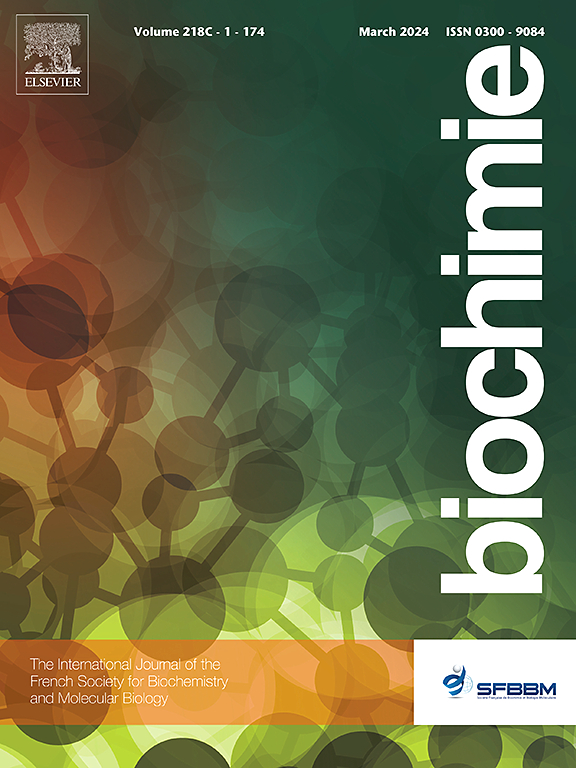Assessing N-terminal acetylation status of cellular proteins via an antibody specific for acetylated methionine
IF 3.3
3区 生物学
Q2 BIOCHEMISTRY & MOLECULAR BIOLOGY
引用次数: 0
Abstract
N-terminal acetylation is being recognized as a factor affecting protein lifetime and proteostasis. It is a modification where an acetyl group is added to the N-terminus of proteins, and this occurs in 80 % of the human proteome. N-terminal acetylation is catalyzed by enzymes called N-terminal acetyltransferases (NATs). The various NATs acetylate different N-terminal amino acids, and methionine is a known target for some of the NATs. Currently, the acetylation status of most proteins can only be assessed with a limited number of methods, including mass spectrometry, which although powerful and robust, remains laborious and can only survey a fraction of the proteome. We here present testing of an antibody that was developed to specifically recognize Nt-acetylated methionine-starting proteins. We have used dot blots with synthetic acetylated and non-acetylated peptides in addition to protein analysis of lysates from NAT knockout cell lines to assess the specificity and application of this anti-Nt-acetylated methionine antibody (anti-NtAc-Met). Our results demonstrate that this antibody is indeed NtAc-specific and further show that it has selectivity for some subtypes of methionine-starting N-termini, specifically potential substrates of the NatC, NatE and NatF enzymes. We propose that this antibody may be a powerful tool to identify NAT substrates or to analyse changes in N-terminal acetylation for specific cellular proteins of interest.
通过乙酰化蛋氨酸特异性抗体评估细胞蛋白质的 N 端乙酰化状态。
N 端乙酰化被认为是影响蛋白质寿命和蛋白稳态的一个因素。这是一种在蛋白质 N 端添加乙酰基的修饰,80% 的人类蛋白质组都存在这种情况。N 端乙酰化由称为 N 端乙酰转移酶(NATs)的酶催化。各种 NATs 对不同的 N 端氨基酸进行乙酰化,蛋氨酸是某些 NATs 的已知靶标。目前,大多数蛋白质的乙酰化状态只能通过有限的几种方法进行评估,其中包括质谱法,虽然质谱法功能强大、稳健,但仍然很费力,而且只能检测蛋白质组的一部分。我们在此介绍一种抗体的测试结果,该抗体可特异性识别 Nt-乙酰化蛋氨酸起始蛋白。除了对 NAT KO 细胞系裂解物进行蛋白质分析外,我们还使用合成乙酰化和非乙酰化肽进行点印迹,以评估这种抗 Nt-乙酰化蛋氨酸抗体(抗 NtAc-Met)的特异性和应用。我们的研究结果表明,该抗体确实具有 NtAc 特异性,并进一步表明它对某些亚型蛋氨酸起始 N-端具有选择性,特别是对 NatC、NatE 和 NatF 酶的潜在底物具有选择性。我们认为,该抗体可能是鉴定 NAT 底物或分析特定细胞蛋白 N 端乙酰化变化的有力工具。
本文章由计算机程序翻译,如有差异,请以英文原文为准。
求助全文
约1分钟内获得全文
求助全文
来源期刊

Biochimie
生物-生化与分子生物学
CiteScore
7.20
自引率
2.60%
发文量
219
审稿时长
40 days
期刊介绍:
Biochimie publishes original research articles, short communications, review articles, graphical reviews, mini-reviews, and hypotheses in the broad areas of biology, including biochemistry, enzymology, molecular and cell biology, metabolic regulation, genetics, immunology, microbiology, structural biology, genomics, proteomics, and molecular mechanisms of disease. Biochimie publishes exclusively in English.
Articles are subject to peer review, and must satisfy the requirements of originality, high scientific integrity and general interest to a broad range of readers. Submissions that are judged to be of sound scientific and technical quality but do not fully satisfy the requirements for publication in Biochimie may benefit from a transfer service to a more suitable journal within the same subject area.
 求助内容:
求助内容: 应助结果提醒方式:
应助结果提醒方式:


